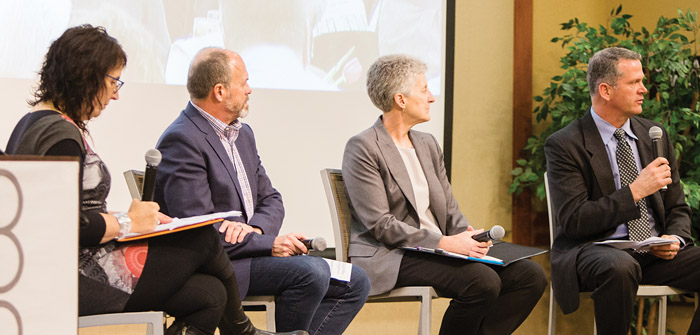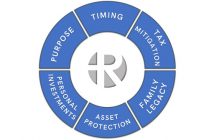(Photo above: (L-R) Julie Harrelson, Wes Price, Becky Johnson and Roger Lee | Photo by EDCO-Marisa Chappell)
EDCO Event Hails Region’s Economic Growth Amid Potential of $2.5 Billion in Capital Investments
An annual forum hailed Central Oregon’s impressive recent economic achievements and discussed potential challenges looming on the horizon, as a nationally-acclaimed keynote speaker advocated for philanthropic-based “community capitalism” to help build an even stronger environment for future generations.
Over 600 attendees packed Bend’s Riverhouse Convention Center for the Economic Development for Central Oregon (EDCO) annual luncheon, and heard how the Bend-Redmond metro area led the nation in job growth last year, with a 6.6 percent leap in employment.
The region’s continued economic growth was recognized through accolades including Bend-Redmond topping the Milken Institute’s U.S. Best-Performing Small Cities index – with rankings based on categories such as job and wage growth and proportion of emerging tech-related industry — while the area came in at #5 on finance technology company SmartAsset’s List of The Top 10 Boomtowns of 2016.
In those reports, the area’s expanding healthcare system was acknowledged as providing economic stability, while vibrancy was evident in an ability to diversify the economic base through new waves of innovation.
Tourism continued to be a major factor, with other fundamental building blocks including the establishment of the OSU-Cascades four-year university, a strong community college presence, growing tech sector, food and beverage and outdoor product clusters, as well as strong entrepreneurial activity and venture capital resources.
EDCO Executive Director Roger Lee revealed the organization was currently working with some 212 companies considering relocation or expansion in the area, representing potentially around 2,400 projected new jobs and $2.5 billion in capital investments.
In the context of such a period of economic resurgence — compared to the dark days of 2009 when the area faced a 17.2 percent unemployment rate and plummeting home prices — Julie Harrelson, CEO of Harrelson Group and Fund Director for entrepreneurial ecosystem supporter Cascade Angels, moderated a panel discussion on how to balance growth while retaining the quality of life that Central Oregon offers.
Fellow panelists included Lee, OSU-Cascades Vice President Becky Johnson and Wes Price – EDCO’s Board President and partner in the Central Oregon accounting firm Price Fronk & Co. — who expressed concern about addressing pressing infrastructure needs.
Price said, “Now is the time to fix basic infrastructure issues such as transportation and sewer and water capacity. If we don’t get in front of that you can get out of sync and hamper progress. A lot of companies are also expressing concerns about the availability and affordability of housing for employees here and it is going to take a collaborative effort to address such challenges.
“We were way too heavy construction-based during the last downturn and it is encouraging that, in part thanks to EDCO’s efforts, there has been a significant diversification in the job base — especially in the traded sector which has a beneficial multiple effect locally — which is a tribute to the groundwork EDCO laid since the last recession and to an increased regional involvement across cities in the tri-county area.”
He added that there was also approaching a much-needed conversation on tax reform on both a national and state-wide basis.
Johnson emphasized OSU-Cascades’ commitment to engaging with the community and interfacing with local organizations and businesses, including faculty collaborating in terms of research and economic incubation.
Regarding recent growth, she said, “The university has made a difference, but it is not just that – we have high-quality education here across the board, including COCC and in K-12 schools who are preparing students for future success.
“As the university branch has grown we are gratified to have contributed to the workforce — we currently have 120 full-time and fifty part-time staff — and to the local economy, with estimates predicting that by 2025 we will have a $200 million impact, including from students who come from outside the area.
“A college presence can also be a stabilizing influence regarding business cycles, as people often go back to school to acquire new skills during a downturn.
“When we got here in 2009, we started conversations about what degrees were needed and worked with businesses regarding what kind of graduates they would like to see, which helped lead to the designing of programs such as those in computer science, accounting, energy systems engineering and kinesiology. We are also excited to be working, with Hydro Flask’s help, on an outdoor products qualification.”
Lee added, “Recognition in terms of the national accolades we have received provides some validation in terms of the broader diversification we now have in our economy, including growth in the hi-tech sector, biosciences, specialty food and outdoor products businesses.
“Regarding previous forecasts, 2016 turned out better than thought and 2017 is shaping up to be better than that, and to some extent we are trying to keep pace with trying to help employers create jobs.
“Now is the time to grow and expand and to judiciously prepare for the next phase in the business cycle, with some experts anticipating a market correction in 2019.
“Right now we still have high growth rates and relatively low costs of capital and it could be an opportune window to ‘make hay while the sun shines’.”
Guest speaker Ron Kitchens, who is CEO of Kalamazoo-based economic consulting firm Southwest Michigan First and recognized as an influence globally on leadership, and creating thriving multi-generational teams, lobbied for creating “sticky communities” for economic success, where metro areas excel in educating and training their people to keep them in the area and in local industries.
Kitchens authored a best-selling book titled Community Capitalism about how Kalamazoo has leveraged community resources and spirit to revitalize its economy in the face of the massive forces of globalization which had previously resulted in substantial job losses.
Weaving in compelling stories from around the world, the book outlines a revolutionary new economic development strategy that “leaders of all stripes can embrace to re-imagine a better future for their communities and organizations”.
One initiative that Kitchens spearheaded was the “Kalamazoo Promise” which is a pledge by a group of anonymous donors — which he was instrumental in assembling — to pay up to 100 percent of tuition at any of Michigan’s state colleges or universities for graduates of the public high schools of Kalamazoo.
Since its launch in 2005, enrollment in the school district has grown by 16 percent, test scores have improved and a greater proportion of high school graduates are attending college.
Research published by the Upjohn Institute in 2015 shows that the initiative significantly increases college enrollment, college credits attempted, and credential attainment, and concluded that such scholarships can both increase educational attainment and provide net economic benefits.
Kitchens added that a movement led by local benefactors helped raise $200 million for a new medical school in the Kalamazoo area, which had produced numerous spin-off economic benefits.
In his opening address to the EDCO luncheon crowd, he speculated that the so-called “Arab Spring” uprisings in the Middle East in 2010 were essentially a result of frustration stemming from people not being able to get job.
He said, “There are almost 1.8 billion people on the planet who get up and don’t have a job, and make no mistake about it we are facing a global war for jobs.
“I believe the greatest force for change is a well-paying job. A good job changes people’s self-worth; it changes a family’s socioeconomic status; it grows communities and raises education. For this reason I have dedicated the past 25 years to economic development with one mission: to create jobs.
“But jobs are not just the responsibility of organizations like EDCO solely, but of the entire community, and it has been proven that communities with better job growth have higher home prices, higher education standards and lower crime rates.
“With the retiring of the Baby Boomer generation we are seeing the greatest transfer of wealth ever, and they want to invest and contribute in environmentally sound ways that make a social impact.
“Change needs to be community driven and one can’t underestimate the power of groups of thoughtfully committed individuals to come together to be a positive force, and for government, philanthropy and the community to intersect to create an environment to create better and higher paying jobs.
“The communities of the future are those that figure out how to educate and retain the workforce of the future that meets the need of employers.
“I don’t believe we have a national economy, rather we have a collection of regional economies. Washington D.C. can’t have the same impact as when communities coalesce around a common cause.”
Kitchens said he grew up in abject poverty and realized education was his way out of those circumstances. A good student, he excelled as an athlete until a knee injury quashed any future professional sports aspirations.
With the help of an “incredible mentor” he got into the convenience store business while he continued collegiate studies and he was instrumental in expanding that company’s retail footprint across multiple locations, but in the process discovered his real passion was in helping create jobs.
When he saw that other friends in college could not return to their hometown to make a viable living, he contested a city council election at the age of twenty and won on a platform of revitalizing the economy, but soon realized that while local government could provide a bridge to resources it did not have the capacity alone to escalate jobs.
Kitchens said he knew intimately the costs of not having a good education and the harsh realities of poverty growing up, which helped foster his determination to get an education and a dedication to be a force for community change.
His parents left school at eighth grade and tragically his father died young in an industrial accident in part because his illiteracy meant he could not read warning signs.
Thereafter Kitchens’ mother struggled to make ends meet. He recollected, “We spent our life thinking if only mom could get a better job our lives could change” and he attended some 13 different schools as the family often had to escape evictions and leave their home hurriedly.
He said, “Toys and clothes were among the first things to be left, but you always took the food.
I will never forget when some anonymous donors from a church left us a box of food around Christmas that included a can of mandarin oranges, which were a prized and scarce tropical fruit in the ‘70s.
“We thought they should be saved for a really special occasion and I kept that can of oranges on my converted dinner tray desk all through my studies, as a reminder of that generosity and of what my mother saw as the costs of not having a good education.
“But you know it became more than a symbol — and to this day I always have a can of mandarin oranges on my desk, and I wear something orange every day as a reminder of my responsibility to do some little thing to help others and help build leaders in the community.
“One of the things I am involved with is raising funds for about a thousand needy families each year to receive a Christmas dinner in Kalamazoo — and each box includes a can of mandarin oranges.
“I believe if we can harness our time, talent and treasure through philanthropy we can make major positive changes in the communities of the future. Entrepreneurial philanthropy will change the face of the community.
“Here in Central Oregon, your engagement and passion for each other is evident and you have created one of the best communities in the world. Others recognize that, and now you are at a catalyzing point in creating what your future will be about.
“With the successes you have already seen economically for a region this size you can take ownership of your destiny.
“You can say that we are not going to go backwards, we are going to create more jobs than we have people coming here because of the amazing quality of life here — and that is a rare thing; most places in the country don’t have that — and help nurture the companies of the future.”
EDCO
Economic Development for Central Oregon (EDCO) is a private nonprofit organization dedicated to diversifying our regional economy by attracting new investment and jobs. For more information, visit website at www.edcoinfo.com or email info@edcoinfo.com





